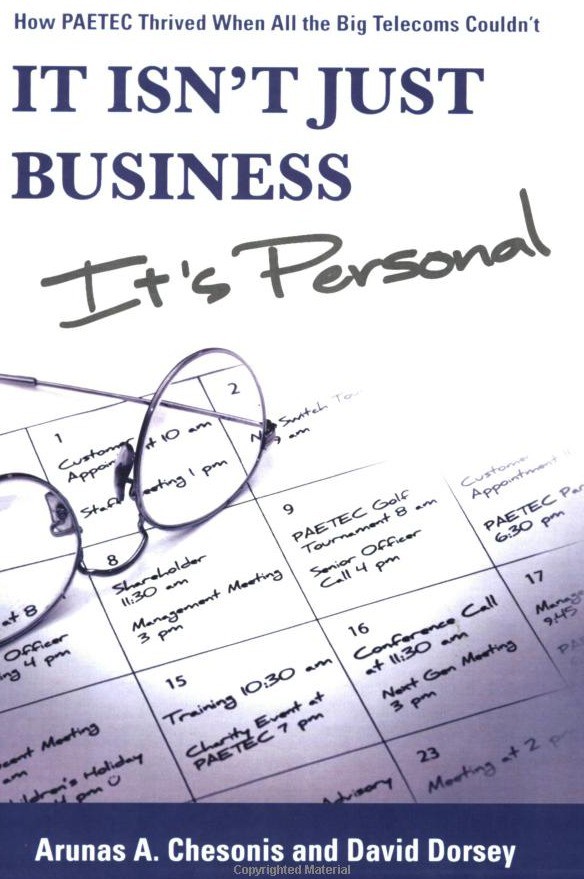
Irony: Chesonis' 2007 book has this description on Amazon.com -- "When you put people first, you win. When you operate by the highest principles, you'll see the results in the bottom line. When you put a caring heart into how you operate, in your organization and your community, you build the only true foundation of long-term success."
Eight acres of rubble and a big hole in the ground.
That’s what residents of Rochester, N.Y., are calling the former site of Midtown Plaza, America’s first indoor shopping mall, torn down to make room for the new headquarters of PAETEC Corporation — headquarters that may never be built.
Now the city of Rochester has declared war on the proposed acquisition of PAETEC by Little Rock, Ark.,-based Windstream, suggesting the combined company may renege on its commitment to construct new headquarters in downtown Rochester after New York State and Rochester city taxpayers spent $60 million on an economic development package for the company.
In a letter to the Federal Communications Commission, the mayor’s office declared its official opposition to the merger proposal, citing the economic impact of wasted tax dollars and the deal’s impact on local jobs:
The Commission will note from the body of this correspondence that the City may be negatively affected if the transfer of PAETEC to Windstream takes place. The federal, state and local governments have worked to develop the site for the purpose of establishing a PAETEC headquarters in Downtown Rochester; tailoring a development package and investing millions to make this location shovel ready for development. New York State provided the Project’s most significant monetary investment, proceeding with the understanding that the Project would retain and grow employment in the Rochester region. It is in the public interest to examine, not just the financial and planning impact that this will have on the City, but to also study the effect this will have on employment, the communities surrounding the City and the lives of the individuals who may be affected.
[…] In anticipation of the PAETEC Project, New York State and the City invested $60 million to demolish the former improvements on the Midtown Site and create a shovel ready building site. To insure the success of the PAETEC Project, the City produced a development package (“Development Package”) which expedited and customized the demolition of the existing buildings at the Midtown Site to accommodate PAETEC’s construction schedule and provide a foundation for PAETEC’s corporate headquarters.
[…] The Development Package was intended to benefit a New York State employer and help that employer retain its current employees and hire additional employees to grow its business. Despite all the efforts of the City to facilitate and provide the positive economic environment for the PAETEC Project, Windstream has indicated that it intends to reduce PAETEC’s current 850-employee Monroe County workforce.
The two companies filed a joint response with the Commission essentially telling the city to stay out of the merger deal, and their concerns about PAETEC’s headquarters and how many jobs will ultimately be lost are not within the Commission’s power to review anyway.
PAETEC CEO Arunas Chesonis, who earlier put the highest praise for his company’s success on the employees who helped build it into what it is today, told a group of fellow business leaders a different story than he told readers of his 2007 book.
“For people who feel let down, we in Rochester should want to be let down like this 50 times a year,” Chesonis said. “Rochester will be a major operating center for the company. So along those lines, we have to figure out how many jobs will be in Rochester. We should be talking about the people that are going to lose their jobs. What are those people going to do next?”
Presumably collect unemployment, critics charge. Among them is former Mayor William Johnson, who has criticized the city for bending over backwards for the ever-evolving plans for new PAETEC headquarters, which have been downsized repeatedly since they were originally announced. Johnson thinks Windstream may have effectively put a knife in the back of taxpayers and the mayor’s office, and could ultimately exit the city of Rochester leaving countless local employees out of work.
Windstream seems resolute in its plans to cut what it calls “duplicative staffing positions.” It reminded the FCC the agency “has routinely approved transactions in which—as will be the case in this transaction—increased efficiencies and economies of scale and scope are expected.”
That is code language for PAETEC employees: Update your resume. You may need it.
[flv width=”640″ height=”380″]http://www.phillipdampier.com/video/WHEC WHAM Rochester PAETEC Windstream 10-11.flv[/flv]
Finger-pointing over a messy, uncompleted downtown construction project. PAETEC may be planning to renege on a $60 million taxpayer-financed economic development package after it announced plans to merge with Windstream. Reports from WHEC and WHAM-TV. (6 minutes)
 Besides sports, the biggest challenge for cord-cutters is to find access to 24-hour news channels they give up when they cancel pay television service. While cable news often doesn’t actually spend much time on “news” when breaking stories are few and far-between, when something serious does happen, cord-cutters looking for live coverage can and do miss access to news networks.
Besides sports, the biggest challenge for cord-cutters is to find access to 24-hour news channels they give up when they cancel pay television service. While cable news often doesn’t actually spend much time on “news” when breaking stories are few and far-between, when something serious does happen, cord-cutters looking for live coverage can and do miss access to news networks.

 Subscribe
Subscribe






